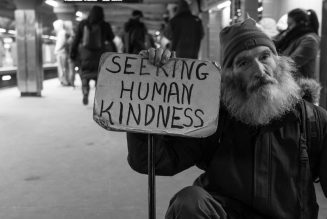
Jesus gives the secret to peace on earth, happiness in your home, harmony in the Church, and eternal life this Sunday, the Seventh Sunday in Ordinary Time Year C.
The bad news is, that secret is so repugnant to our fallen human nature we can barely force ourselves to even try it.
“Do good to those who hate you,” Jesus says. “Bless those who curse you.” In short, “Love your enemies.”
This is really, really hard to do. It means, “Do good to the person who works, hard, to utterly upturn your side of the COVID arguments over vaccines and masks.” It means, “Bless those who hate you because of who you voted for.” It means, “Love those who call you a bigot because of what you believe about marriage and gender.” Or, just as hard: “Bless those Catholics who undercut you and your friends because you are traditional,” and “Do good to those Catholics who reject you because you aren’t traditional enough.”
But in fact, the only way you will ever get close to Jesus Christ, the way, truth, and life, is to conquer precisely those relationships in your life, through his love.
Remember, Christian love means action. It doesn’t mean feeling good about others, it means doing good to benefit others. St. Paul gave his commentary on this teaching in Romans. “If your enemy is hungry, feed him; if he is thirsty, give him drink,” he says. This will “overcome evil with good.”
You will often find that when you respond with love, you inspire love.
“Do to others as you would have them do to you,” is a self-fulfilling prophecy. It works like this: The more you oppose others, the more strongly they will build defenses against you; the more you love them, the more open they become.
There is a scene in in the Iraq war movie Hurt Locker where soldiers tackle and shackle an Iraqi citizen after a tense confrontation. “Is he an insurgent?” someone asks. “If he wasn’t, he sure is now!” the protagonist answers.
The fact is, the more you treat others as the worst version of a human being they could possibly be, the more like the worst version of a human being they will become. The more you treat them like someone who deserves love and respect — the more lovable and respectable they will be.
Try it in the next argument you have with a spouse, family member, or coworker. When you answer with love, you will lose lots of verbal battles, but will eventually win the person over.
And try the same thing in your next ideological battle: Seek to understand your opponent, truly and thoroughly seeing their point of view. In fact, go further: Look at your opposing camp with an open mind, looking for every scrap of truth in what they say, and look at those in your own bubble with a critical eye, looking for the flaws in their logic. You will be surprised what a shortcut to the truth that is.
But Jesus doesn’t just want you to give the benefit of the doubt to ideological opponents. He literally says to absorb injuries and reward thieves.
“To the person who strikes you on one cheek, offer the other one as well,” he says.
For us, that means, “To the person who cuts you off in traffic, yield,” and “When someone brushes past you rudely, back off,” or even, “When someone cuts in front of you in line, give up your place.” This is “Blessed are the meek” in action.
What it doesn’t mean, is “enable abusers.” If someone is doing real harm, “Blessed are the meek” has to give way to “Blessed are they who hunger and thirst for justice.”
As for rewarding thieves, when Jesus says, “from the person who takes your cloak, do not withhold even your tunic,” he is clearly talking about someone who is poor taking what is essential for living.
When the Catechism defines theft as “usurping another’s property,” it adds, “There is no theft … if refusal is contrary to reason and the universal destination of goods.” The “universal destination of goods” is the principle that “The goods of creation are destined for the entire human race” over and above private property rights. In short: If someone needs what you own and you don’t, it should go to them.
What does this look like for us? It may mean overlooking being overcharged by someone who is worse off than you — a waitress, a serviceperson, or a handyman. It also means budgeting your money such that you are in a position to give to those in need.
Loving your enemy is really, really hard to do. So the readings give strong motivations to do it. First: To be like God.
“Love your enemies and do good to them, and lend expecting nothing back; then your reward will be great and you will be children of the most high,” says Jesus.
Why? Because “He himself is kind to the ungrateful and the wicked.” And the wicked who God is kind to, alas, includes me. I, too, have sinned against people, injuring or cheating them. God has loved me anyway. I have even sinned directly against him, violating the first three commandments, and he blessed me anyway.
He has even made me his friend despite it all.
“The Lord defines friendship in two ways,” says Pope Benedict XVI. First, “there are no secrets between friends: Christ tells us everything he hears from the Father; he gives us his full confidence.” Jesus is giving us that full confidence in today’s Gospel. But then “the second element with which Jesus defines friendship is the communion of wills. Idem velle – idem nolle, (same likes, same dislikes) was also for Romans the definition of friendship.”
We love our enemies because our friend Jesus loves them. This is why, in the first reading, though Saul has been warring against David out of jealousy, David spares Saul when he has a chance to kill him. “Today, though the Lord delivered you into my grasp, I would not harm the Lord’s anointed,” David tells him.
We also have to spare those people who may be at a wicked place in their lives, but who God hopes to save. He made them in his image and he loves them, so we respect and love them too.
A second reason to love your enemy is because you know what they are destined to become.
As C.S Lewis put it, “the dullest most uninteresting person you can talk to may one day be a creature which, if you saw it now, you would be strongly tempted to worship, or else a horror and a corruption such as you now meet, if at all, only in a nightmare.”
He had in mind the same lesson Paul teaches in the Second Reading.
“The first man was from the earth, earthly; the second man, from heaven,” he says. He is comparing the first Adam, who was, in one creation story, formed from the dust of the earth, with the Second Adam, Jesus Christ, who is the “Word made flesh,” God himself made man.
“Just as we have borne the image of the earthly one, we shall also bear the image of the heavenly one,” he says. The Christian starts out in Adam’s line, inheriting his sin. By uniting ourselves with Christ in baptism and the sacraments we are adopted into Christ’s line, inheriting his divinity.
You are truly made for greatness and glory — as is every single person who cuts you off in traffic, tries to foist gender ideology on your school, and knowingly cheats you out of your money.
But too often, when we see people making errors and doing wrong, we think of ourselves as Olympic judges whose job is to observe and criticize, instead of swimming pool lifeguards whose job is to observe and save lives. Instead, “The judge of the sinning soul must be higher than that soul,” said Cyril of Alexandria. “Since you are not, the sinner will object to you as judge. Why judge your neighbor? But if you venture to condemn them, having no authority to do it, it is yourself rather that will be condemned, because the law does not permit you to judge others.”
And that’s the third reason to love your neighbor: Your eternal life depends on it.
The stakes couldn’t be higher. “Stop judging and you will not be judged. Stop condemning and you will not be condemned,” says Jesus in the Gospel, for “the measure with which you measure will in turn be measured out to you.”
But the Gospel also sets our mind at rest: Though the stakes are high, the bar for your love is not. Loving others doesn’t mean fawning all over them and being energized by being around them. It means forgiving them instead of judging and condemning.
“To help accept an individual and open ourselves to a particular person more, visualize him with the Lord Jesus and say to the Lord, ‘I love him because You love him,’” says Father Robert DeGrandis S.S.J. “Forgiveness is an act of the will, not a feeling. If we pray for a person, we can be assured that we have forgiven that person.”
To forgive is to love, and to love is to be loved by God who is Love, forever.
Join Our Telegram Group : Salvation & Prosperity







